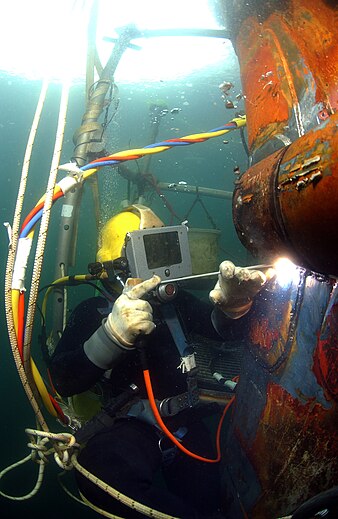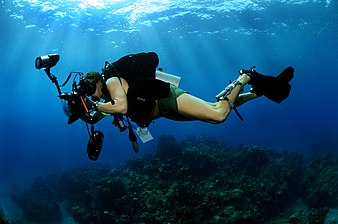Diving activities are the things people do while diving underwater. People may dive for various reasons, both personal and professional. While a newly qualified recreational diver may dive purely for the experience of diving, most divers have some additional reason for being underwater. Recreational diving is purely for enjoyment and has several specialisations and technical disciplines to provide more scope for varied activities for which specialist training can be offered, such as cave diving, wreck diving, ice diving and deep diving.[1][2] Several underwater sports are available for exercise and competition.[3]
There are various aspects of professional diving that range from part-time work to lifelong careers. Professionals in the recreational diving industry include instructor trainers, diving instructors, assistant instructors, divemasters, dive guides, and scuba technicians. A scuba diving tourism industry has developed to service recreational diving in regions with popular dive sites. Commercial diving is industry related and includes civil engineering tasks such as in oil exploration, offshore construction, dam maintenance and harbour works. Commercial divers may also be employed to perform tasks related to marine activities, such as naval diving, ships husbandry, marine salvage or aquaculture.[4][5][6] Other specialist areas of diving include military diving, with a long history of military frogmen in various roles. They can perform roles including direct combat, reconnaissance, infiltration behind enemy lines, placing mines, bomb disposal or engineering operations.[7]
In civilian operations, police diving units perform search and rescue operations, and recover evidence. In some cases diver rescue teams may also be part of a fire department, paramedical service, sea rescue or lifeguard unit, and this may be classed as public safety diving.[8][9] There are also professional media divers such as underwater photographers and videographers, who record the underwater world, and scientific divers in fields of study which involve the underwater environment, including marine biologists, geologists, hydrologists, oceanographers and underwater archaeologists.[10][6][11]
The choice between scuba and surface-supplied diving equipment is based on both legal and logistical constraints. Where the diver requires mobility and a large range of movement, scuba is usually the choice if safety and legal constraints allow. Higher risk work, particularly commercial diving, may be restricted to surface-supplied equipment by legislation and codes of practice.[12][11][13]
- ^ Cite error: The named reference
Technical divingwas invoked but never defined (see the help page). - ^ Cite error: The named reference
richardson1999was invoked but never defined (see the help page). - ^ Cite error: The named reference
CMAS Sports committeewas invoked but never defined (see the help page). - ^ Cite error: The named reference
OSHA 1910.410was invoked but never defined (see the help page). - ^ Cite error: The named reference
Careerswas invoked but never defined (see the help page). - ^ a b Cite error: The named reference
Sokanuwas invoked but never defined (see the help page). - ^ Cite error: The named reference
Robinson 2002was invoked but never defined (see the help page). - ^ Cite error: The named reference
Phillips 2015was invoked but never defined (see the help page). - ^ NOAA Diving Manual (2001), Chapter 1 History of Diving and NOAA Contributions.
- ^ a b Cite error: The named reference
CoP Scientificwas invoked but never defined (see the help page). - ^ Cite error: The named reference
CoP Inshorewas invoked but never defined (see the help page). - ^ Cite error: The named reference
SA Diving Regulations 2009was invoked but never defined (see the help page).
© MMXXIII Rich X Search. We shall prevail. All rights reserved. Rich X Search


